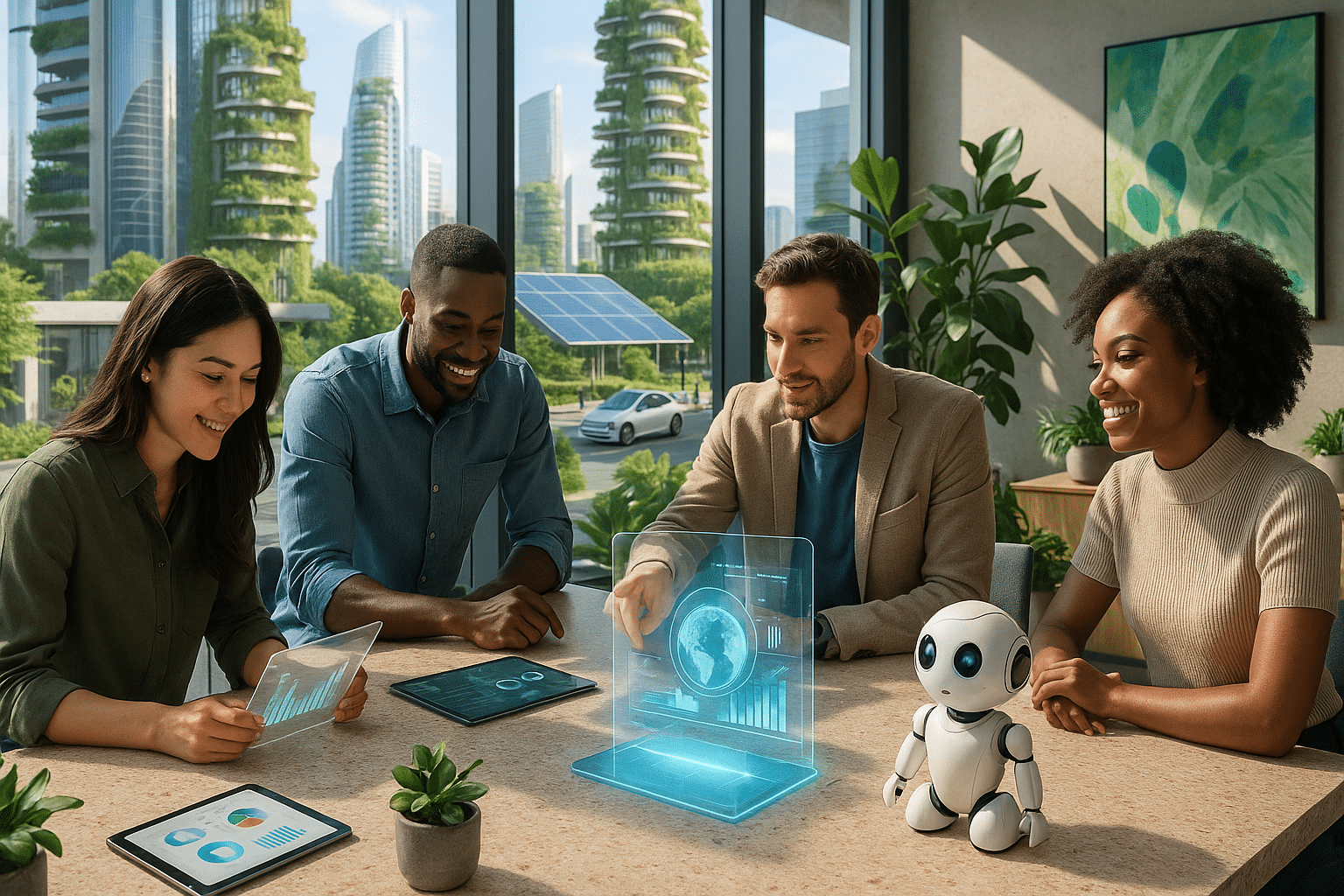We’re about to embark on a thrilling journey to explore the unfolding horizons of Corporate Social Responsibility (CSR) in 2025. The landscape is changing fast, and we’re here to make sure you’re not left behind. 🚀
As the clock ticks towards 2025, we’re seeing an exciting evolution of CSR, morphing from a buzzword into a vital business strategy. It’s no longer an add-on, but an integrated component of business models worldwide. But what does the future look like for CSR? How will these changes impact businesses and communities? This comprehensive guide will address these questions and more.
Anticipate a deep dive into the transformative trends shaping the future of CSR. We’ll explore the rise of digital technology in driving sustainable practices, the emergence of CSR in SMEs, and the increasingly crucial role of stakeholder engagement. 🌍
Moreover, we’ll venture into the profound impact of CSR on brand reputation and consumer loyalty, illustrating with real-world examples. You can also expect an insightful discussion about the interplay between CSR, environmental sustainability, and the drive towards a circular economy.
Our journey won’t stop there. We’ll also delve into how CSR initiatives can spearhead social innovation and contribute to achieving the United Nations’ Sustainable Development Goals (SDGs). Now, that’s something to look forward to! 🌱
Before we dive in, let’s acknowledge this shift isn’t occurring in a vacuum. External factors like regulatory changes, societal pressure, and technological advancements are playing a pivotal role in shaping the future of CSR. As we journey together into this future, we’ll examine these drivers in detail, ensuring you’re equipped with a comprehensive understanding of the dynamics at play.
In this guide, we’re not just painting a picture of the future; we’re also providing you with a roadmap to navigate it. Expect actionable insights, strategies, and tools to harness the power of CSR in driving business growth and creating societal impact. Whether you’re a seasoned CSR professional or just beginning your journey, this guide is your indispensable companion for the road ahead. 🧭
So, are you ready to explore the contours of a future where business meets responsibility in a whole new way? A future where CSR is not just a corporate commitment but a catalyst for sustainable development and social change? Strap in, because we’re about to take off to the future of CSR in 2025. Let’s go! 🚀
🌟 Introduction: Paving the Path to the Future of CSR
Corporate Social Responsibility (CSR) has traditionally been seen as an auxiliary function of companies, often treated as a side project or PR gimmick. However, this perspective is changing rapidly. As we step into the future, CSR is evolving to play a pivotal role in the business models of organizations worldwide. By 2025, it’s predicted that CSR will be fully integrated into every business decision, ensuring that corporations operate ethically, sustainably, and responsibly. But how will this transition happen? Let’s explore this fascinating evolution by envisioning the future forward of CSR.
Our journey begins with a detailed exploration of the current state of CSR, including its benefits, limitations, and prevalent trends. From there, we’ll delve into what the future holds, examining how emerging trends and innovations will reshape the landscape of CSR by 2025. Buckle up, because this is going to be an exciting ride into the future!
And don’t forget, if you’d like to see this journey in a more dynamic format, make sure to watch the video “The Future of CSR” by McKinsey & Company on YouTube. It provides a captivating visual overview of the evolution we’re about to dive into.
🔍 The Current State of CSR: An In-Depth Analysis
CSR, as we know it today, has its roots in the late 20th century. Back then, corporations began to realize that they had responsibilities beyond just maximizing shareholder profits. This led to the birth of CSR as a discipline, where companies started to incorporate societal concerns into their business operations. Today, CSR includes a wide range of initiatives, such as reducing carbon emissions, supporting local communities, and promoting diversity and inclusion.
However, CSR still faces several challenges. Many companies treat it as an optional extra, rather than an integral part of their business. This often results in half-hearted initiatives that make little impact. Additionally, there is a lack of standardization in CSR reporting, which makes it difficult to assess and compare the effectiveness of different initiatives.
To better understand the current state of CSR, let’s take a look at the table below. It provides a comparison of the top 5 companies with the most comprehensive CSR programs, according to the 2020 CSR RepTrak report.
| Company | CSR Score | Key Initiatives |
|---|---|---|
| The Lego Group | 73.6 | Children’s education and sustainability |
| Natura & Co | 73.5 | Environmental sustainability and fair trade |
| Microsoft | 73.2 | Technology accessibility and inclusion |
| 72.2 | Data privacy and renewable energy | |
| Nestlé | 71.9 | Nutrition, health, and environmental sustainability |
🔮 Predicting the Future: CSR Trends to Watch Out for By 2025
The future of CSR is set to be defined by several exciting trends. Let’s take a closer look at how these developments will shape CSR by 2025.
🌿 Sustainability Will Be Integral
One of the key trends shaping the future of CSR is the increased focus on sustainability. By 2025, sustainability will be at the heart of all CSR initiatives, with companies working to minimize their environmental impact and contribute to a greener planet. This will involve everything from reducing waste and conserving energy to investing in renewable energy sources and eco-friendly technologies.
🌐 Global Collaboration for Greater Impact
Another important trend is the rise of global collaboration. Companies will increasingly work together to tackle major societal challenges, such as poverty, inequality, and climate change. This will involve forming cross-industry alliances, participating in international CSR initiatives, and sharing best practices to maximize the impact of their CSR efforts.
💡 Innovation Will Drive CSR
As we approach 2025, innovation will play a crucial role in CSR. Companies will leverage cutting-edge technologies, such as AI and blockchain, to streamline their CSR initiatives and enhance their impact. For instance, AI can help companies better analyze their sustainability data, while blockchain can improve transparency in supply chains.
To get a visual representation of these trends, make sure to watch the video “Top CSR Trends for 2025” by Deloitte on YouTube. It provides an engaging and comprehensive overview of these future developments.
🚀 Navigating the Future: Preparing Your Business for the Evolution of CSR
As we move towards 2025, businesses need to be prepared to navigate the changing landscape of CSR. This requires a proactive approach, where companies not only stay abreast of the latest CSR trends, but also embed CSR into their core business strategy.
To start with, businesses should create a clear CSR vision, which aligns with their overall business goals and reflects their commitment to societal and environmental responsibility. This vision should guide all their CSR initiatives and be communicated to all stakeholders, including employees, customers, and investors.
Next, businesses need to invest in the necessary resources to implement their CSR initiatives effectively. This includes not only financial resources, but also human resources, such as dedicated CSR teams and training programs for employees.
Finally, businesses should leverage technology to maximize the impact of their CSR initiatives. This involves using data analytics to measure their CSR performance, AI to streamline their CSR processes, and digital platforms to engage with their stakeholders.
By embracing these steps, businesses can ensure that they are well-prepared to navigate the future of CSR, creating a better world for everyone.
For more insights into how businesses can prepare for the future of CSR, watch the video “CSR 2025: Preparing for the Future” by Accenture on YouTube. It provides valuable tips and strategies for businesses to successfully navigate the evolution of CSR.

Conclusion
In conclusion, this article has taken an in-depth exploration into the crucial concepts of IT and software engineering. We started off by discussing the fundamentals, such as the importance of software design and development, followed by the specific processes that are involved in software engineering. These ranged from the preliminary analysis to system testing and maintenance.
The article further elaborated on different software development models like the Waterfall Model and Agile Methodology, highlighting their unique characteristics and areas of application. We then looked into key programming concepts and the role they play in software engineering. Not forgetting the importance of system testing and the various techniques used to ensure software quality and functionality.
Finally, we discussed the ethical considerations in software engineering and the imperative role of a software engineer in the IT industry. It is clear that software engineering is an exciting field, with endless possibilities for creativity, problem-solving, and continuous learning.
The key take-away from this article is that software engineering is not just about coding. It’s a multidisciplinary field that requires a deep understanding of various technical and non-technical aspects. A successful software engineer is one who can not only code but also design, test, maintain systems, and make ethical decisions when necessary.
If you’ve been following along, you’re now equipped with the basics and even more. If you’re already in the field, this article has hopefully refreshed your knowledge and provided some new insights. If you’re aspiring to be a software engineer, I hope this article has inspired you to take the next steps towards your career goal.
Remember, the more you learn, the more you realize there’s more to learn. So, keep exploring, keep learning. Every line of code you write is a step towards making a difference in the world of technology. And remember, success is not a destination, but a journey. So enjoy every step of it. 😊
Please feel free to share your thoughts or ask any questions in the comment section below. And if you found this article helpful, don’t hesitate to share it with your friends and colleagues. Your feedback and engagement are what motivate us to continue delivering high-quality content.
Happy Coding! 💻
For more resources on software engineering, check out the following links:
[IEEE Computer Society](https://www.computer.org/technical-committees/software-engineering/) – The leading organization for software engineering professionals.
[Association for Computing Machinery](https://www.acm.org/) – The world’s largest educational and scientific computing society.
[Software Engineering Institute](https://www.sei.cmu.edu/) – A research center sponsored by the U.S. Department of Defense, it provides resources on software engineering practices and technologies.
Your journey has just begun, keep going! 🚀
References:
1. IEEE Computer Society. (2022). [Software Engineering](https://www.computer.org/technical-committees/software-engineering/).
2. Association for Computing Machinery. (2022). [ACM](https://www.acm.org/).
3. Software Engineering Institute. (2022). [SEI](https://www.sei.cmu.edu/).




